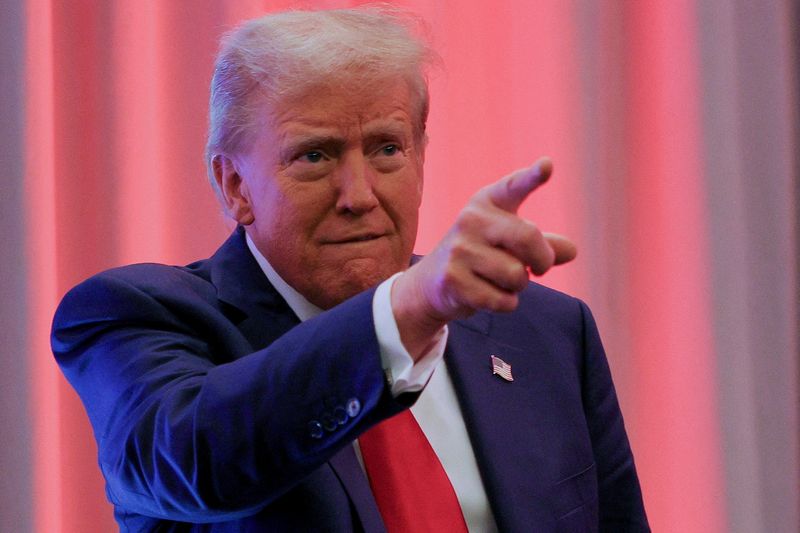By Naomi Rovnick
LONDON (Reuters) -Big global investors are exiting popular trades that bet on U.S. President-elect Donald Trump’s tax and tariff policies boosting Wall Street and wreaking damage abroad and swooping in on some of the Nov. 5 election's biggest market victims.
After U.S. stocks and the dollar bounced on Trump's growth agenda and trade war fears pressured Chinese, European and emerging market assets, money managers are hunting for bargains in places where pessimism may have gone too far.
"The thesis that Trump is good for the U.S. and bad for the rest of the world is a very common narrative," said John Roe, head of multi-asset funds at Legal & General (LON:LGEN) Investment Management, which manages 1.2 trillion pounds ($1.52 trillion) of investments.
He said this had convinced him to buy non-U.S. assets that may have been excessively sold - like European car-makers and the Mexican peso - and close pre-election positions that profited from sterling and Chinese tech stocks falling.
European auto stocks touched their lowest in almost two years on Wednesday while the Mexican peso has fallen more than 2.5% versus the dollar this month and sterling is down some 5% against the greenback since end-September.
Shaniel Ramjee, a multi-asset co-head at Pictet Asset Management, which runs 254 billion Swiss francs ($285.43 billion) of client funds, said he had increased holdings of Chinese stocks and Brazilian bonds since the election.
"There will be a really good opportunity in assets that have weakened ahead of and after the election, we see a lot of value," he said.
Investors are now questioning the popular market view that Trump will aggressively pursue policies that exacerbate U.S. inflation and derail Federal Reserve rate cuts, given voter anger about living costs and consumer price rises.
TOO FAR?
Since the eve of the election, U.S. stocks have risen more than 4% while European equities have fallen about 1% and emerging market shares are at two-month lows.
"The news flow (for non-U.S. markets) is so negative right now that any kind of good news could move things quickly," Morningstar European equity strategist Michael Field said.
The euro, down about 3% since Trump's win, hit a one-year low of $1.052 this week and 10-year U.S. Treasury yields jumped 14 basis points (bps) to 4.47%, as traders bet on higher U.S. interest rates and inflation.
Europe is mired in pessimism, exacerbated by the collapse of Germany's government and fears for exporters, with Volkswagen (ETR:VOWG_p) shares trading at about 3.3 times forecast earnings and European chemical producers down 11% since late September.
Most investors surveyed by Bank of America last week had an underweight stance on Europe, meaning they expected the region's markets to trail the United States and Asia.
But Edmond de Rothschild Asset Management chief investment officer Benjamin Melman said he would keep his European exposure at market-neutral levels instead of joining the selling.
"That is brave in this environment," he said, while noting that European Central Bank rate cuts could stimulate bank lending and business activity.
He had also bought Chinese equities since the U.S. election, he said.
INFLATION NATION?
Barclays (LON:BARC) economists said while Trump's threatened 60% import tax would shave two percentage points off Chinese economic growth, the tariffs would likely be much lower and implemented gradually.
Pictet's Ramjee said investors were too focused on Trump's proposed import taxes and underestimated the political risk of tariffs increasing consumer prices.
"I think Trump will be very focused on making sure he doesn't cause an inflation spike," he said.
Ramjee said he had backed out of U.S. Treasuries before the election but would buy again if yields, which move inversely to prices, kept rising.
Craig Inches, head of rates and cash at Royal London Asset Management, which runs almost 170 billion pounds, said he had taken profits on a pre-election bond trade that benefited from U.S. inflation expectations rising.
UK government bonds, prices of which have declined alongside Treasuries, now looked "exceedingly cheap", Inches said.
Marlborough CIO Sheldon MacDonald expected Trump's tax and spend agenda to boost U.S. growth and global trade, limiting blows to overseas nations from tariffs.

"What's good for the U.S. tends to be good for the rest of the world," he said, adding that because Wall Street stocks were expensive he favoured Britain's exporter-heavy FTSE 100, which has fallen about 1.3% since Nov. 5.
($1 = 0.7881 pounds)